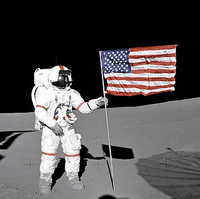American culture has long had a fascination with outer space. President John F. Kennedy described it as "this new ocean," and words like "destiny" and "frontier" are frequently used to characterize America's relationship to it. Hollywood and the media often approach it with a sense of wonder, humility, and even a bit of fear. From the opening strains of "2001: A Space Odyssey" to the aliens from "Avatar," space remains a source of mystery.
This cultural phenomenon may be a remnant of the first two-thirds of the 20th century, when in the span of a single lifetime, it was possible to witness the rapid progress from Wilbur and Orville Wright's 12-horsepower, wood-and-fabric Kitty Hawk aircraft to the Saturn rocket's 8.7 million pounds of thrust that landed a man on the moon. For a time, the 20th century even earned the moniker, "The Space Age." Then, it all stopped. Human history moved on.
To be sure, the space program continued to contribute memorable events, but none that matched the age that culminated in landing a man on the moon. The men who took part in that epic adventure remain recognizable even today. Buzz Aldrin, the second man to walk on the moon, recently appeared on the popular television program, "Dancing with the Stars," more than 40 years after he became a household name. By contrast, only a handful of people can name even one of the astronauts currently living aboard the International Space Station.

